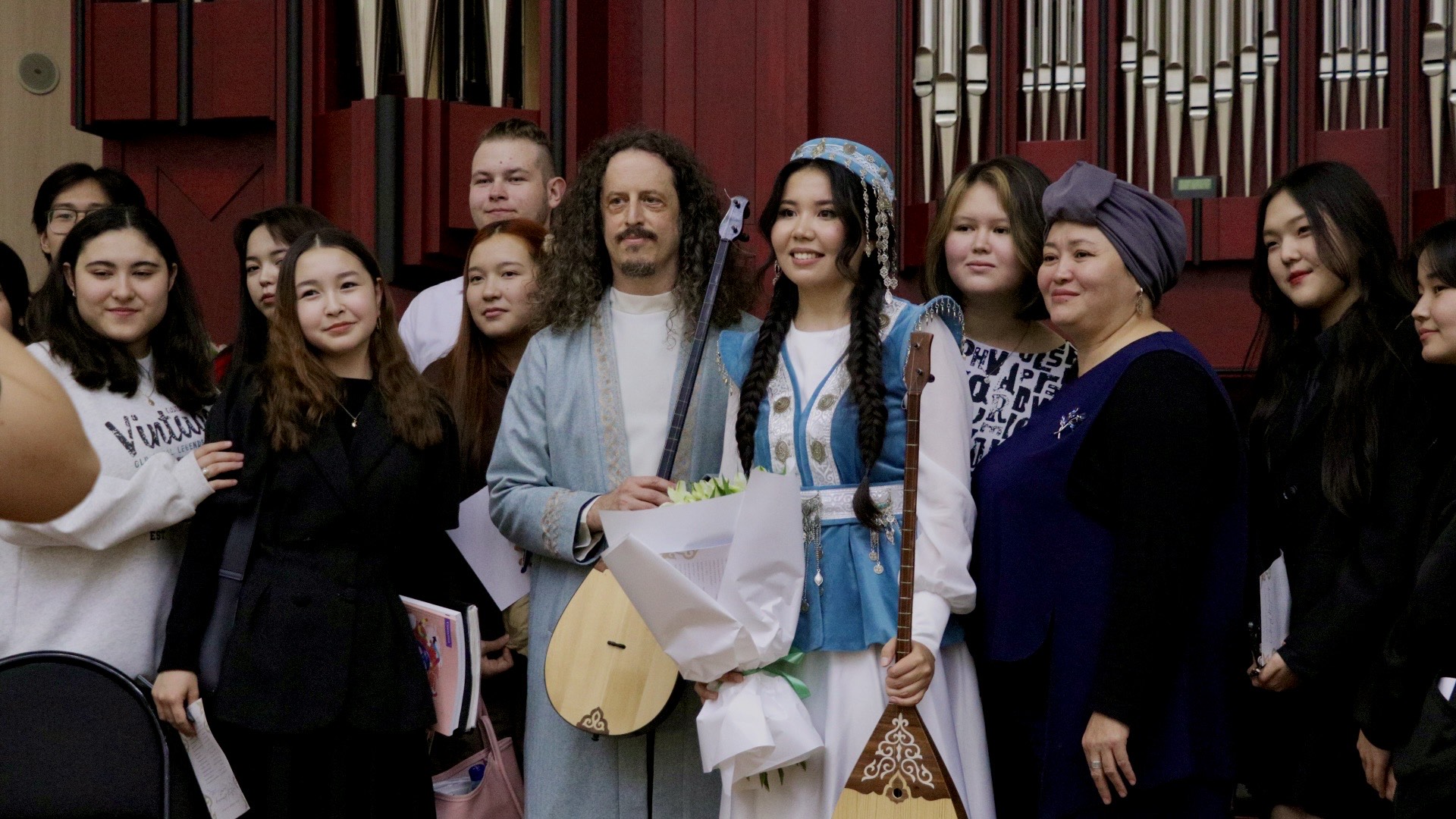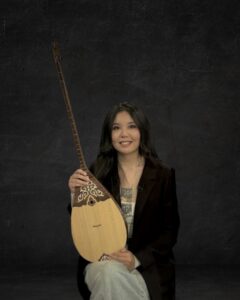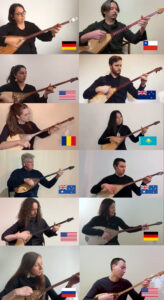World
Kazakh Musician Bridges World Through Dombra – The Astana Times

ASTANA – Kazakh musician and cultural ambassador Aigerim Myrzakhmet, founder of the World Dombra Academy, is dedicated to fostering cultural exchange and inclusivity by teaching the dombra, the national musical instrument, to students worldwide.
Geoff Gersh from the United States and Aigerim Myrzakhmet with the audience after their concert in Astana. Photo credit: Myrzakhmet’s personal archieve
“Through my work, I aim to connect people from around the world through music and culture. I also lead initiatives like the international virtual ensemble and a cultural exchange program that brings people to Kazakhstan, creating opportunities to learn from and celebrate diverse perspectives,” she told The Astana Times.

Aigerim Myrzakhmet, a founder of the World Dombra Academy. Photo credit: Myrzakhmet’s personal archieve
Aigerim Myrzakhmet’s journey with the dombra began at the age of eight at a music school in Kazakhstan. Later, as part of the Global Undergraduate Exchange Program in the United States, she introduced international audiences to the dombra’s unique sound.
She underscores the instrument’s importance, stating that the dombra is a symbol of Kazakh culture and history.
“Its unique sound reflects the vastness of the steppes and the richness of our traditions. What’s incredible is how its simple design can express such a wide range of emotions, from joy to sorrow, which is something people worldwide connect with. The dombra is not just about preserving our heritage—it is a bridge between generations, keeping our identity and history alive and bringing people together across the globe,” said Aigerim Myrzakhmet.
Teaching the dombra was not initially planned, but it emerged organically, as foreigners, captivated by the instrument and its cultural heritage, began reaching out online.
This inspired her to establish the World Dombra Academy, where students from over 30 countries learn to play the dombra in English and become ambassadors of Kazakh culture in their communities.
Global outreach through music
Aigerim Myrzakhmet emphasized that teaching the dombra is about more than technique—it is about cultural connection. She integrates lessons with stories about Kazakh traditions, history, and the deeper meanings behind the melodies.

Myrzakhmetova and her students from eight countries performing a Kazakh melody online. Photo credit: Myrzakhmet’s personal archieve
One standout moment for her was teaching an online group from the United States, Germany, Chile, and New Zealand.
“Despite their diverse cultural backgrounds, ages, and musical experiences, they shared a common passion for the instrument and a curiosity about Kazakh culture,” she said.
One of her students in the United States, inspired by what she learned, composed original kuis (traditional compositions played on dombra) and songs, showcasing how the dombra fosters creativity and cultural exchange.
Aigerim Myrzakhmet said she begins her lessons with simple pieces like “Nar Agashi,” “Kelinshek,” and “Qos Alqa” to accommodate her beginner students, many of whom have no prior musical experience.
“These are easy to learn and provide a solid foundation before tackling more challenging compositions. As students improve, they often request iconic Kazakh melodies like “Adai”, “Erke Sylkym,” and others, which have deeper cultural significance and are more complex,” she said.
Her teaching philosophy blends tradition and innovation, incorporating both classic and modern pieces to keep the process dynamic and engaging.
“I do not like to limit what my students can learn. Some come to me with specific songs they want to try, whether Kazakh or from other Turkic cultures. I love encouraging their interests, as it keeps the learning process exciting and allows them to explore the diversity of Central Asian music,” said Aigerim Myrzakhmet.
She also shared a humorous moment with a student from Australia who struggled with proper hand positioning for strumming the dombra.
“After getting frustrated, he tied a rope around his hand and body to keep it steady near the strings. It was such a funny yet clever solution that we could not stop laughing. His creativity showed determination, and it worked surprisingly well. It was one of those moments that made me realize how adaptable and committed my students are, even in the face of challenges,” she said.
Overcoming challenges
Aigerim Myrzakhmet acknowledged that teaching dombra internationally comes with challenges, particularly the lack of English-language materials.
“The dombra’s music is passed down through oral tradition or in Kazakh, there is limited written material available for students who are learning in a language other than Kazakh. This is something I have worked to address by creating instructional content in English, which has been essential for making the dombra accessible to a global audience,” she said.
According to Aigerim Myrzakhmet, the dombra’s unique nature presents a steep learning curve, particularly for students new to string instruments or accustomed to Western music.
“The tuning, techniques, and playing style differ significantly from what they might know, requiring patience and understanding. However, I view these challenges as opportunities—not only to teach the music but also to help my students gain a deeper appreciation for and understanding of a new cultural perspective,” she said.
Cultural ambassadors
Many of her students have gone on to promote Kazakh culture in their home countries, a source of pride for Aigerim Myrzakhmet.
In Germany, two students working in education introduced the dombra into their classrooms and the local community.
“Similarly, students from the United Arab Emirates, Romania, and Switzerland perform at cultural events and festivals, sharing Kazakh music. A student in New Zealand performs regularly at the Kazakh consulate, teaches masterclasses, and runs a music school, promoting the dombra to a wider audience,” she said.
One standout story involves Geoff Gersh, a U.S. student who visited Kazakhstan twice to deepen his understanding of the culture.
“This year, with support from the U.S. Embassy, we held concerts in Astana and Almaty that received amazing feedback. His performances were special not just for the music but also for the stories he shared about his journey and his love for Kazakh culture,” she said.
These stories, Aigerim Myrzakhmet believes, exemplify the academy’s mission to foster global unity through music.
“Each of my students, wherever they are in the world, is a cultural ambassador, sharing Kazakh music and culture and creating a ripple effect that transcends borders. Moments like these remind me of music’s incredible power to foster understanding, connection, and unity across the world,” she said.
Looking ahead, Aigerim Myrzakhmet plans to expand the academy’s reach with comprehensive online lessons and interactive content to make learning the dombra accessible worldwide.
“I also want to create programs that bring my students to Kazakhstan to perform and immerse themselves in the culture. This will not only provide them with hands-on experience but also allow them to connect directly with the roots of the music,” she said “I hope to travel abroad with my students to perform in their countries, further promoting the dombra and Kazakh culture on a global stage.”

:max_bytes(150000):strip_icc()/former-sweater-designer-and-these-18-nordstrom-knits--tout-social-1c175c5be472493bbf8cb8e987299ada.jpg)








